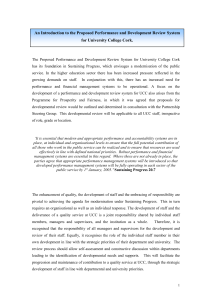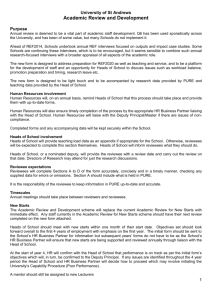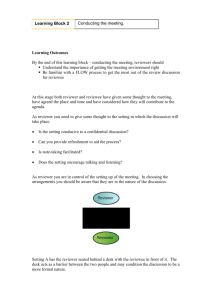Revised Tenured Faculty Review (TFR) Procedures and Policies
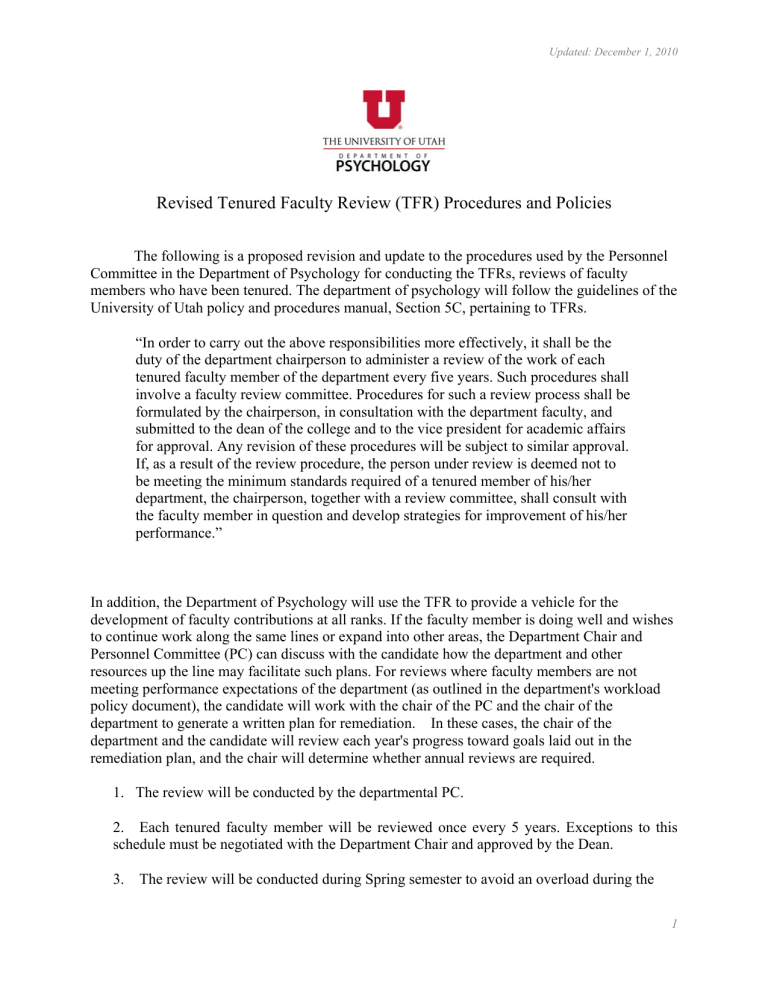
Updated: December 1, 2010
Revised Tenured Faculty Review (TFR) Procedures and Policies
The following is a proposed revision and update to the procedures used by the Personnel
Committee in the Department of Psychology for conducting the TFRs, reviews of faculty members who have been tenured. The department of psychology will follow the guidelines of the
University of Utah policy and procedures manual, Section 5C, pertaining to TFRs.
“In order to carry out the above responsibilities more effectively, it shall be the duty of the department chairperson to administer a review of the work of each tenured faculty member of the department every five years. Such procedures shall involve a faculty review committee. Procedures for such a review process shall be formulated by the chairperson, in consultation with the department faculty, and submitted to the dean of the college and to the vice president for academic affairs for approval. Any revision of these procedures will be subject to similar approval.
If, as a result of the review procedure, the person under review is deemed not to be meeting the minimum standards required of a tenured member of his/her department, the chairperson, together with a review committee, shall consult with the faculty member in question and develop strategies for improvement of his/her performance.”
In addition, the Department of Psychology will use the TFR to provide a vehicle for the development of faculty contributions at all ranks. If the faculty member is doing well and wishes to continue work along the same lines or expand into other areas, the Department Chair and
Personnel Committee (PC) can discuss with the candidate how the department and other resources up the line may facilitate such plans. For reviews where faculty members are not meeting performance expectations of the department (as outlined in the department's workload policy document), the candidate will work with the chair of the PC and the chair of the department to generate a written plan for remediation. In these cases, the chair of the department and the candidate will review each year's progress toward goals laid out in the remediation plan, and the chair will determine whether annual reviews are required.
1.
The review will be conducted by the departmental PC.
2. Each tenured faculty member will be reviewed once every 5 years. Exceptions to this schedule must be negotiated with the Department Chair and approved by the Dean.
3. The review will be conducted during Spring semester to avoid an overload during the
1
2 review of non-tenured faculty in Autumn.
4. The review will be conducted under the following procedure. a.
Faculty members will be chosen for review in Spring of the academic year preceding their review, and will be notified that they are scheduled for a TFR the following year. Any requests for postponement of the review should be made to the Department Chair at this time. Faculty designated for review will be excluded from membership on the PC during the semester in which they are being evaluated. b.
A review team will be assigned to each candidate composed of:
1.
One member of the PC, equal to or higher in rank than the reviewee, will be designated as the PC reviewer.
2.
The reviewee may designate another faculty member, of any rank, who is not a PC member, as an additional member of the review team. This additional review team member should be selected by mid-Fall semester preceding the review. c. External letters may be obtained as part of the review, but it is expected that this will be the exception. The PC will typically seek external letters when they do not feel there is sufficient expertise within the department to evaluate the quality of the reviewee's contributions to the field. This may occur if the reviewee is publishing in areas with which psychology faculty are unfamiliar, when there are diverging opinions between the reviewee and the committee as to the nature of the reviewee's contributions, or when the reviewee is working in an emerging area for which standards of evaluation have not yet formed.
During mid- to late fall semester preceding the review, the review team will obtain a copy of the reviewee's vita, and have an initial meeting with the reviewee and the area head to determine their views as to whether external letters would be useful for the review process. This information will be discussed within the PC, who will then decide whether to seek external letters. (Reviewees may themselves request that the committee seek external letters even if the committee would not have otherwise decided to do so.) In cases where external letters will be sought, suggestions for evaluators will be obtained from the reviewee and from the area head (in consultation with faculty in the area and/or faculty in cross areas relevant to the reviewee's profile).
The number of letters and nature of the feedback sought will depend on the particular areas that the committee or reviewee feels would benefit from an outside perspective
(e.g., feedback on the outlets in which a reviewee has been publishing if these outlets are unfamiliar.) The requests for evaluation by external reviewers will be sent no later than mid-January of spring semester. In accordance with U Policy 6-303-III-D-9, each reviewee will be provided with the option to waive or retain his/her right to review the external evaluations prior to letters being requested (to be included in the reviewee's file). External evaluators will then be informed regarding the anonymity
3 of their letters in advance. d. At the beginning of Spring semester, Department faculty, graduate students and staff receive a memo stating which faculty members are being reviewed and inviting them to contact review team members if they wish to be interviewed about any reviewee. The review team will then gather relevant material. The material gathered will address the goals of the reviewee and the themes that emerge during the review process, but will, in almost all cases, include information of the following types:
1. An updated vita, research, teaching and service statements, copy of previous review (promotion or TFR), and copies of workload assignments for the reviewee during the years covered by the review
2. Representative publications or products of scholarship (2-3)
3. Data on the reviewee's teaching on the graduate and undergraduate levels.
Primary data include student evaluation ratings and comments for representative courses during the review period and the reviewee's teaching statement.
4. Interviews with a small numbers of faculty and students (typically, Area
Coordinator, 1-2 colleagues, 2-3 students, and anyone who requests an interview).
The review team will inquire about the reviewee’s research, teaching and supervision, and service. Interviewees will be given the opportunity in advance of the interview to see copies of the reviewee's vita, research, teaching and service statements, and representative publications or products. Although all three areas will be relevant to the review process, it is expected that some faculty may have developed approved workload profiles in which their contributions are greater in one area than the others. f. After completion of the data gathering, the review team will prepare a draft of the report. The report will include updated tables of the reviewee's publications and presentations, and teaching evaluations, as well as updates on grant activities and service activities since the previous (promotion or TFR) review. Although research, teaching and service contributions will all be discussed in the report, the discussion will be framed by the relative weights placed on these three areas by the workload agreement under which the reviewee had been working. For example, if an individual's workload agreement places greater emphasis on teaching relative to research or service, then discussion of the individual's contributions will correspondingly place greater emphasis on the teaching contributions. This report will then be discussed within the PC committee.
4 g. The review team revises the report as necessary after committee discussion.
1. The report will be shown to the reviewee who will be allowed to correct factual errors and/or respond in writing within one week of receipt of the document. At this point the reviewee drafts a summary of planned and future goals, taking into account feedback from the report. These goals will aid the development function of the TFR, and will not be included as part of the official PC report.
2. The PC report and reviewee's response, if any, will be forwarded to the
Department Chair. h. The chair of the PC and the chair of the Department will meet with the reviewee to discuss the report and make plans to facilitate the achievements of the reviewee's future goals, as outlined by the reviewee upon receiving the report and shared with the chairs of the PC and Department. Plans for remediation and/or shifts in workload assignments will also be discussed if needed. i. The Department Chair will prepare a report at the conclusion of the review process.
The reviewee will be given an opportunity to respond in writing to the Department
Chair's report. j. The report of the PC, reviewee's responses, if any, and the Department Chair's report will be forwarded to the Dean of the College at the close of the academic year. k. The final PC report will kept by the departmental Administrative Assistant. Faculty members of any rank can request to view the TFR reports from the Administrative
Assistant. An announcement will be made when these are available.
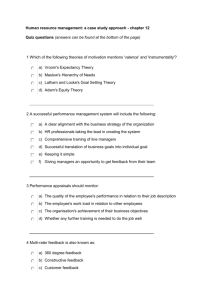
![Our Proposed Teachers' Pay Policy Made [as] Simple](http://s3.studylib.net/store/data/009449663_1-ace1f548d59156f3c612bc39171242c1-300x300.png)

